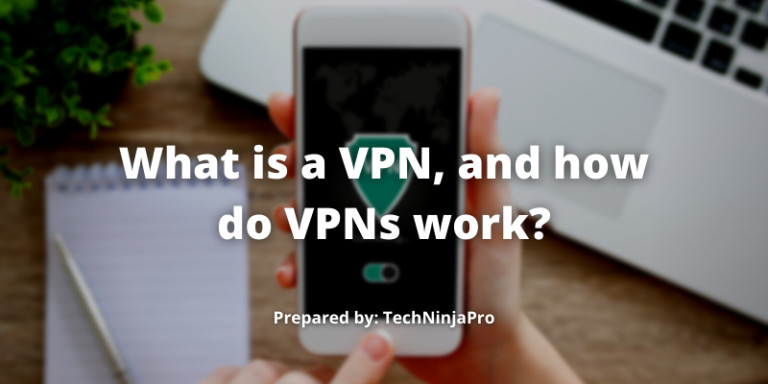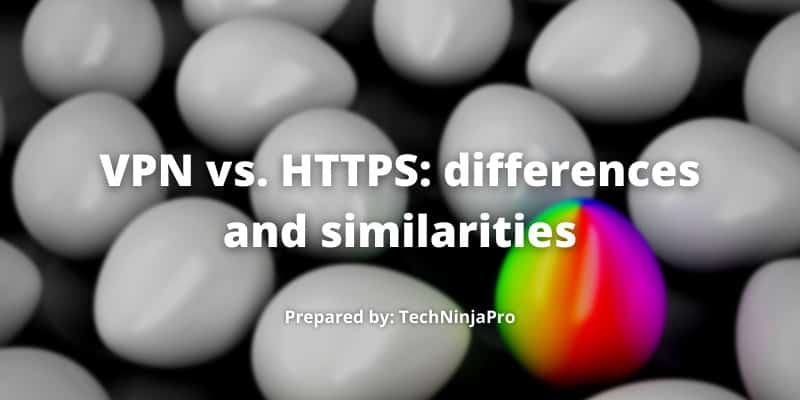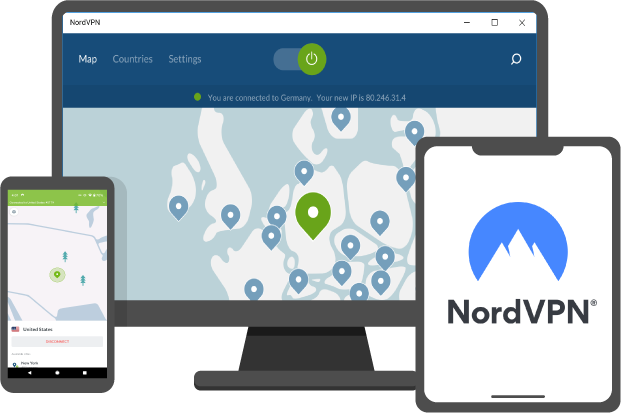Virtual private networks and HTTPS are two essential technologies for online protection. Many internet users ask which one is better, but comparing them is like comparing oranges to apples. Both are amazing tools to use, but for diverse reasons. Best of all, they recommend each other so that you can use both for an easy internet browsing experience on the internet.
Both VPNs and HTTPS do similar things in different ways, so it is clear why some users confuse the two. Virtual private networks and HTTPS are tools used to protect users and their privacy, but fortunately, you can use both when it comes to HTTPS vs. VPN. If you have ever heard about VPNs or HTTPS, you will know that they both have to do with encryption. That sounds perfect. Instead of letting your data travel openly via the wilderness of the internet, you protect it with encryption, and everything is secure.
In this blog, TechNinjaPro is going to explain what the difference is between VPNs and HTTPS.
What is HTTPS?

Hypertext Transfer Protocol Secure is what protects your data when you visit sites. To see anything, for example, on this webpage, you need to send various requests and download the content hosted on a server. You used to see HTTPS at the beginning of a site address everywhere.
It is the main protocol for communication between the user and the web server. HTTPS ensures the site’s authenticity, encrypts and protects the information from man-in-the-middle, phishing, and information manipulation attacks.
How Does HTTPS Work?
It is essential to know that HTTPS has to be configured on the server that hosts the site. It is up to the site’s owner to set it up and install a certificate that is later used to protect the internet connection. This protocol guards the internet traffic to and from a site using SSL/TLS encryption algorithms.
It uses asymmetric key cryptography principles to make sure the integrity and authenticity of the transferred information. Once a connection with a server is created, all the internet traffic is encrypted and can only be decrypted by the site and user’s internet browser. Any information manipulation and editing would invalidate the connection, and trying to sniff the internet traffic would be useless since the attacker cloud sees the garbage data.
Since the HTTPS security certificate can be installed on a site by its owner, a regular user has no control over it. Unlike a virtual private network, the site visitor cannot select to connect safely if a web server is not configured properly. Now, let’s have a look at what can the virtual private network do.
What is a VPN, and how do VPNs work?

Now when knowing about HTTPS and VPNs to tell which is better should not be a question. The purpose for each of them is different, and in fact, they complement each other perfectly. HTTPS makes sure the authenticity of information and secure connection, while a virtual private network is used as an extra layer of security on top, that also handles corner cases and other network connections that are coming not only from your internet browser.
This includes many application traffic such as torrenting or gaming, DNS requests, and others. There are still a lot of sites that do not use security certificates and thus are weak. If there is no HTTPS set up on the site, using a VPN is the best option to keep your connection private and guard your data from eavesdroppers.
VPN protects your online identity and information when you browse the internet. VPN acts as a tunnel between your devices such as mobile phones, tablets, PCs, and an unsecured internet network. To create an encrypted internet connection between you and the web, all you have to do is download a VPN app from trusted VPN providers and install it on your device.
With a commercial virtual private network, you can connect to a broad range of servers from every corner of the world, and not even your internet service provider can track the internet activity and information traveling between your system and the server. Moreover, your actual IP address is covered with another one corresponding to the server’s location of your choice. For instance, you browse from the USA, but you appear as if you are from a different country with a VPN service.
A virtual private network provides many benefits, but it does not mean you should always use it. TechNinjaPro has listed a few VPN pros and cons below to help you know better when you may need one.
Benefits
- VPN hide your internet identity
- VPN bypass geo-restrictions
- VPN bypass firewalls and secure your internet connection
Drawbacks
- VPN can reduce your internet speed
- Free VPNs can endanger your online privacy
- Some platforms do not inherently support virtual private networks
VPN vs. HTTPS: differences and similarities

Similarities
- Both VPNs and HTTPS encrypt your data, but a VPN encrypts more of it. HTTPS only encrypts what is sent via an internet browser to a server and back if it is enabled on the websites you visit. A virtual private network will encrypt all internet traffic as long as you keep it on.
- Virtual private networks generally use more upgraded encryption methods. While any encryption is superior to none, a virtual private network can offer you top-notch security. One of the ways it gets that is by using secure VPN protocols that handle quite a lot, and encryption is only one part of it.
- HTTPS can be exposed to some types of cyberattacks. For example, HTTPS may not hold against Root Certificate Attacks, while you should be fine with a virtual private network, Combine both, and it is the perfect team.
- Virtual private networks do so much more than encrypt your information. They change your IP address, let you select a new geographical location, and much more.
HTTPS Or VPN: Which Is Better?
Now when knowing about HTTPS and VPNs to tell which is better should not be a question. The purpose for each of them is different, and in fact, they complement each other perfectly. HTTPS makes sure the authenticity of information and secure connection, while a virtual private network is used as an extra layer of security on top, that also handles corner cases and other network connections that are coming not only from your internet browser.
This includes many application traffic such as torrenting or gaming, DNS requests, and others. There are still a lot of sites that do not use security certificates and thus are weak. If there is no HTTPS set up on the site, using a VPN is the best option to keep your connection private and guard your data from eavesdroppers.
Frequesntly Asked Questions
VPN services are third-party software that protects internet privacy, while HTTPS is a protocol that secures communication over the internet. You do not need a VPN to use HTTPS and vice versa, but you can use both technologies simultaneously to accomplish different goals.
No, VPN services can access SSL traffic, but they cannot decrypt it. Same as your internet service provider can access VPN encrypted traffic, but they cannot decrypt it.
HTTPS uses an encryption protocol called SSL. In fact, the S in the HTTPS stands for secure. If a webpage has the HTTPS prefix, that private information is encrypted, making it much safer and more complex for hackers to decipher.
Conclusion
Using both technologies together provides you double protection. HTTPS ensures a connection and information is not modified, while VPN allows covering the internet traffic from ISP, securing vulnerable internet connections, and changing your real IP address and location.





